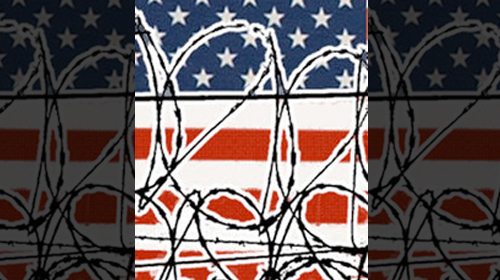
With the world watching, a pre-trial hearing got underway this week in the Guantánamo military commission prosecution of the five alleged 9/11 co-conspirators. Prime among the issues before the military judge was how transparent the commissions will be. The ACLU’s Hina Shamsi argued our motion in support of the public’s constitutional right of access to the proceedings – and against the government’s unconstitutional effort to prevent the public from hearing defendants’ testimony of their torture and abuse in U.S. custody.
Back in April, the government asked the military judge to enter a “protective order” contending, among other things, that because the defendants were “exposed” to the CIA’s classified rendition, detention, and interrogation program, anything they said about it in court could be kept from the public. In September, the government modified its proposal to include a provision defining as “classified” the defendants’ own “observations and experiences” of their illegal treatment and CIA black site detention.
The government wants to use a 40-second delay of the audio feed from the soundproof courtroom to implement its proposed censorship regime. During the 40-second delay, a government censor can use “white noise” to block the public from hearing defendants’ testimony about the CIA’s torture program.
In a series of motions challenging the plan, the ACLU explained why the government’s proposal violates the First Amendment. As we put it in a May filing, “[T]he public’s right of access to these military commission proceedings is mandated by the First Amendment, and may only be overcome if the government presents evidence of a substantial likelihood of harm to an overriding government interest.”
In her argument before Judge James Pohl at Guantánamo on Tuesday and Wednesday (the transcripts are available here and here), Shamsi also described the extreme nature of the government’s proposal:
[E]very day courts around our country deal with classified information without the need to build a censorship chamber. Courts deal with hundreds of sensitive national security and terrorism cases without the need to build a soundproof wall between the courtroom and the American public. No other American courtroom has a government official sitting in the corner with a finger on a censor button. The reason this courtroom was built, the reason for the censorship regime that the government seeks to impose is the government wants to ensure that the American public will never hear the defendants’ accounts of the torture, rendition and black site detaining to which the CIA subjected them.
Arguing before the military judge, the government did not contest our position that the public has a First Amendment right to access the military commission proceedings. It asserted, though, that its proposed restrictions on what the public can hear are necessary to protect national security. But as Shamsi made clear, that position is overly broad and unconstitutional:
[W]e know such controversial information as the fact that the CIA waterboarded [defendant Khalid Sheikh] Mohammad 183 times. We know that the CIA used beatings, forced nudity, threats against family members, including children, stress positions, deprivation of food. If that information is already out there in the public sphere the government does not have a compelling interest in preventing the public from hearing defendants’ testimony about it in this courtroom.
No censorship button was pushed when Shamsi uttered the word “waterboarded.” However, under the proposed protective order, Mohammad’s use of the word could be censored.
During her argument, Shamsi also pointed to the chilling, Orwellian absurdity of the government’s claim that the defendants’ “observations and experiences” of illegal government conduct could be “classified” and kept from the public:
[I]t should go without saying, but perhaps the CIA needs to hear it said: Thoughts, experiences and memories belong to human beings; they do not belong to the government. . . . There are other victims and therefore witnesses to the CIA’s rendition, illegal detention program, who have been released and are free, out there, describing their experiences. If there is no harm that is coming from them, and there is no harm that the government has publicly alleged would come from them, then there is no harm here in this context.
Shamsi ended by emphasizing that it would “do tremendous damage to the legitimacy of these proceedings if they are organized around judicially approved censorship of what the CIA did to the defendants.”
Judge Pohl did not immediately rule on the government’s proposed order and our constitutional objections to it, but indicated that he would issue a modified version of the protective order.
Learn more about military commissions: Sign up for breaking news alerts, follow us on Twitter, and like us on Facebook.


